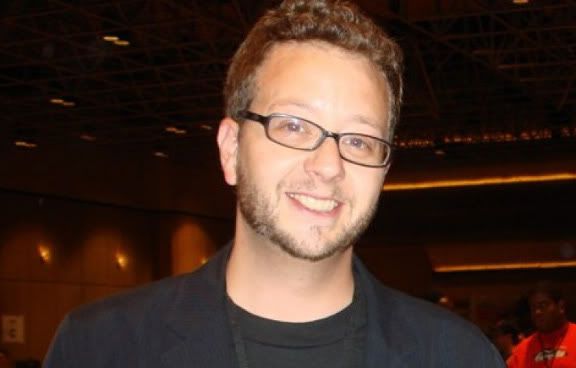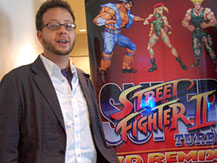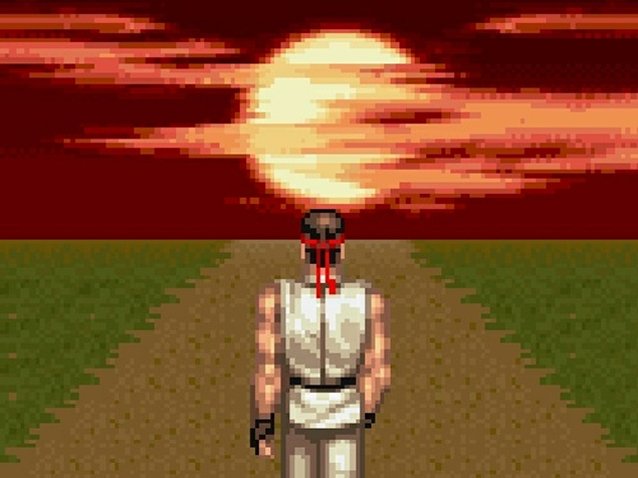This post has not been edited by the GamesBeat staff. Opinions by GamesBeat community writers do not necessarily reflect those of the staff.

I was done. Too many hurdles. Not enough chances. Too many people that have no interest in helping.
Trying to write about video games became too hard a goal to reach.
My prior success in the industry had convinced me that I might have a shot at making this dream come true.
Consistent growth on Bitmob, as well as some time writing for other sites that brought experience and new contacts in the business, increased my confidence.
That confidence was shattered with one swift punch. I floated aimlessly, unable to care anymore about the good work I had done in the past. I stopped. I moved on.
However, an email from Seth Killian turned things around for me.

Pulling the look off, indeed.
Killian, Capcom's soon-to-be former PR guy and community manger for North America, has long been a hero of mine in the industry. After all, this was a former professional Street Fighter player that had done good and broken into the industry in a way that a lot of us dream of doing.
For many years now, Killian has been the face of Capcom's fighting game genre revival. Killian would tout each new release around the country and expose the general public to the wonderful world of the fighting-game community. At any big community event, Killian was always there, looking like the happiest guy in attendance.
Around February of 2011, I was writing for an independent games site, Digital Hippos, working on anything from game reviews to putting out press releases in preview form. Wanting to expand my work for the site, I took a chance and reached out to Seth via email. My hope was to get a few words for an interview. The airwaves were silent for weeks, and I wrote the whole thing off as a failed experiment in attempting to get in contact with the industry, itself.
Consider myself shocked when I opened my email one day last March to find a reply.
We went on to correspond with each other back and forth over the month, discussing the subject of independent development and the genre of fighting games in general. To be honest, I was caught off guard by the fact that he actually responded, and in retrospect I should have asked more questions.
Call it being star-struck. I got over this feeling eventually and got the job done.
In June of that year, my interview with Seth came out. To this day, the interview is the one piece in my portfolio that I am most proud of.
I began to collect a sizeable number of page views, front-page articles, and praise for my writing. For the first time, I finally felt like the idea of being a journalist wasn't so far-fetched.

This thought would be ruined quicker than an intern's dress in the Bill Clinton White House.
At the beginning of 2012, I decided that my time to try and make something happen with my writing had arrived. I had been working at a local newspaper for almost a year and had learned enough about the business to know that there were plenty of chances to try and get my material noticed. I formed a portfolio, made a concise case, and pitched some ideas to someone at the paper in hopes of getting a break.
I was shot down…hard.
The person in question, after spending some time raising their nose in the air about the idea of games journalism and writing online, offered nothing constructive to me. No words of wisdom. No advice on how to make my style or ideas work for print. Nothing of use.
The person in question critiqued my grammar, told me that readers won't care about the specifics of games or the industry, and that games can't be covered like film or television because the stories aren't compelling.

In other words, the typical response. I was crushed. I had worked hard to put together my materials and to be as professional as possible. I wasn't looking for an article on the front page…just a chance for someone to look at my work and point me in the right direction. I had hoped for some help in getting my feet off the ground.
Instead, I was deflated. I stopped writing altogether and told myself that without a journalism degree and a "real topic," I would probably never be given a chance.
On June 19 of this year, Seth Killian announced via his blog that he would be leaving his role at Capcom. I was saddened to hear this, but with Capcom's recent money troubles, I suppose the writing may have been on the wall.
I decided to write Killian one last time to wish him luck and to tell him how much I respected his efforts in the industry. Most of all, I wanted him to know that even though I wasn't writing anymore, talking with him and getting the chance to interview him was one of the biggest thrills of my life thus far.

I assumed that he would be getting a flood of emails, with no time to respond to the common well-wisher. After all, the news of his impending departure was all over the regular news sites.
Once again, I found myself surprised when I received a reply from Mr. Killian:
Will,
I do indeed remember you, and thanks very much for the kind note. I'm sorry to hear you've left game writing–you always seemed engaged and very genuine to me, so perhaps someday you'll come back? At any rate, new adventures for me, but it's been wonderful hearing from so many old friends, and happy to count you among them.
All the best,
Seth
To say that I was surprised that he remembered me would be an understatement. His words of encouragement, along with our past conversations about the industry and writing in general, proved to be a perfect salve for the wound left by my earlier crushing rejection.
I wrote a short piece on a personal blog to shake off the cobwebs. I immediately found myself wishing to write more and decided that I needed to make this story known — if for nothing else than to get back on the horse and write something that was meaningful, no matter what anyone may think of the material.
I give thanks to Seth Killian. Not only has he shown that you can be in the games industry with a passion and love for what you do but that giving up, while easy, shouldn't be the road most travelled.
Thank you, Seth Killian. You kept me writing.

